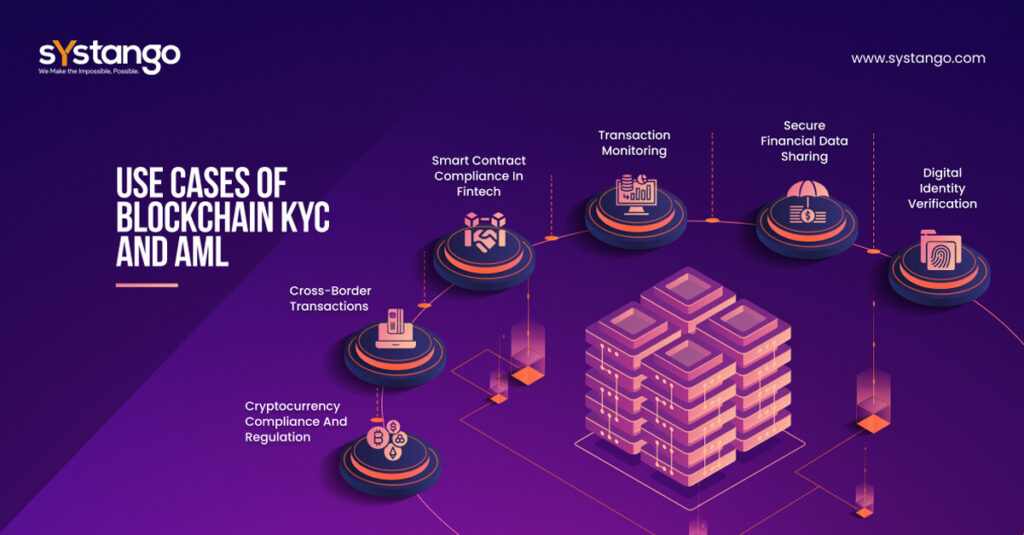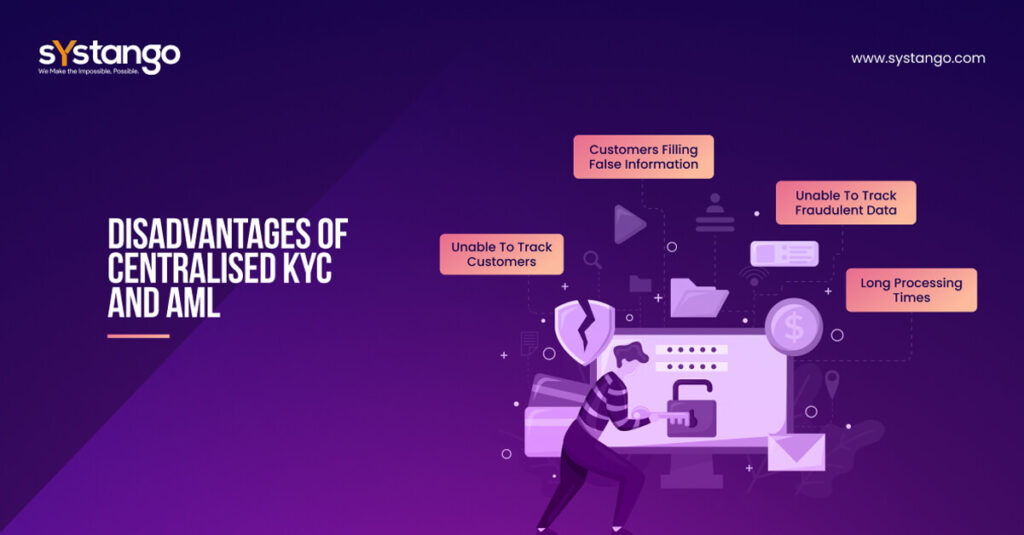Blockchain KYC: The Future Of The Compliance Industry

Blockchain KYC has gained tremendous traction along with surging financial crimes in the compliance industry.
By 2023, it’s projected to reach a value of US$3.18 billion and jump to a staggering US$16.37 billion by 2033. This growth demonstrates the increasing importance of AML measures in our financial systems.
One real-life example that fosters the adoption of KYC and AML solutions is the United Nations Office on Drugs and Crime (UNODC). It estimates that individuals have laundered 2-5% of the global GDP until now.
Financial institutions often get coaxed by their clients for quick transaction regulations, and complying with KYC/AML regulations can be expensive. Traditional KYC compliance programs are slow, manual, and fragmented. It affects clients’ businesses and damages clients’ relationships with the institution.
Blockchain is a boon in addressing these issues. Not only does it simplify the KYC process, but it also reduces the risk of money laundering.
This blog will explain and guide us about Blockchain KYC and its implementation in Fintech.
- What Is Blockchain KYC?
- What Are The Blockchain KYC & AML Use Cases?
- How Does Decentralised KYC Outperform The Centralised KYC?
- How Does Blockchain KYC Work?
- Systango’s Blockchain Services For Compliance Industry
What Is Blockchain KYC?
Have you heard of blockchain identity verification? It’s a cutting-edge solution that utilises decentralised identity management to verify and authenticate the identity of customers in financial transactions.
It’s an upgrade to traditional Know Your Customer (KYC) /Anti Money Laundering (AML), where customers provide personal and financial information for verification by financial institutions.
The blockchain authentication process stores the customer’s data securely and immutably on a distributed ledger, making it nearly impossible for fraudsters to manipulate or falsify the information. Decentralised KYC ensures that the customer’s identity is securely stored and the KYC process is transparent and quick.
Blockchain-based KYC solutions offer a more secure and efficient alternative to traditional KYC/AML processes. They can help financial institutions streamline their compliance processes, and reduce the risk of data breaches.
Blockchain KYC improves customer experience by providing faster and more secure access to financial services. Plus, the decentralised nature of blockchain means that customers have more control over their data, which is always a good thing!
Let’s check out some of the blockchain KYC use cases now!
What Are The Use Cases Of Blockchain KYC & AML?

Blockchain technology is changing the game for KYC and AML compliance by incorporating decentralised KYC and AML compliance solutions.
Speaking of the Fintech industry, blockchain KYC helps them streamline identity compliance processes, reducing the risk of fraud & improving the customer experience.
Blockchain KYC regulations ensure that customer identity information is stored securely and immutably on the blockchain, reducing the risk of identity theft and fraud.
Anti-money laundering (AML) solutions are gaining traction in Fintech. By using blockchain to monitor financial transactions in real-time, financial institutions can detect and prevent suspicious activity that may indicate money laundering or other financial crimes.
These are the fundamental blockchain KYC & AML use cases:
- Digital identity verification
- Secure financial data sharing
- Transaction monitoring
- Smart contract compliance in Fintech
- Cross-border transactions
- Cryptocurrency compliance and regulation
Let’s now comprehend how decentralised KYC is revolutionising centralised KYC!
How Does Decentralised KYC Outperform Centralised KYC?
Talking about the conventional KYC system, every bank and financial institution has a set of KYC rules with no standardisation. This results in people initiating their KYC process with every different bank where they have an account.
And, having a siloed system like a traditional KYC restricts financial institutions. They are unable to track consumer expenses on other platforms. This results in each institution having its incomplete data set.
The clustered & siloed KYC process data results in:

- Unable to track customers
- Customers filling false information
- Unable to track fraudulent data
- Long processing times
With the KYC architecture and Distributed Ledger Technology (DLT), we can gather data from different service providers and store it in a secure, tamper-proof database without relying on a third-party verifier.
Bockchain-based solutions can streamline the KYC process by securing customer and financial institutions’ data. DLT-based KYC eliminates the need for multiple KYC checks across different financial institutions.
Let’s now look at how Blockchain KYC works in the next section.
How Does Blockchain KYC Work?
Let’s say a person named A wants to leverage blockchain for the KYC process:
- A will first create a profile on the KYC DLT portal deployed by his Financial Institution (FI).
- He will perform his transaction on FI and gets access to his user profile.
- In the next step, FI will verify A’s data on the DLT server & upload a hash function on the DLT platform.
- FI will transfer the KYC copy of A to A’s hash-embedded user profile.
- If A changes their KYC details, the previous DLT records will not match.
- Next, if A performs any transaction with a different FI, he will grant access to his actual KYC stored on DLT with the previous FI.
- Now if the KYC hash does not match, the new FI will validate A’s KYC details based and update the same with the help of smart contracts.
- And, if the KYC details match, A can freely process transactions on their new financial account.
This process ensures data quality and originality of the KYC details. And, decentralised KYC minimises the turnaround time of the traditional KYC process.
It mitigates the factor of manual labour in KYC verification and gives enhanced operational efficiency for real-time user data in the Fintech industry.
Let’s see how a blockchain development company like Systango can help with blockchain-based KYC solutions.
Systango’s Blockchain Services For Compliance Industry
Systango offers expert services to help financial businesses leverage the power of DLT for KYC and AML compliance. Our team of experienced blockchain developers for hire design & build secure, decentralised identity management systems that enable efficient KYC and AML compliance.
Our blockchain-based KYC and AML solutions enable seamless integration with existing fintech systems, ensuring streamlined financial operations.
As a blockchain development company, we commit to delivering robust KYC & AML solutions for our fintech clients
Are you looking to enhance your KYC and AML compliance innovatively and securely? Connect with us now!






